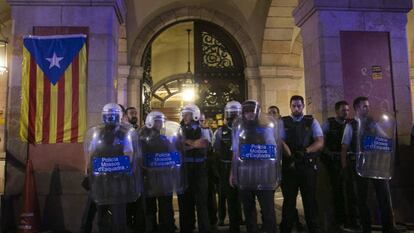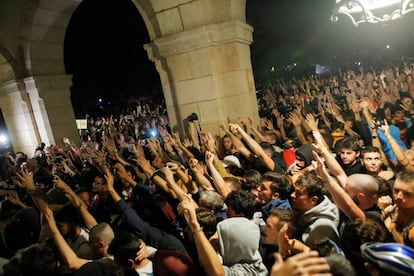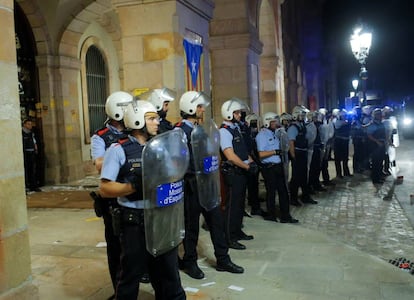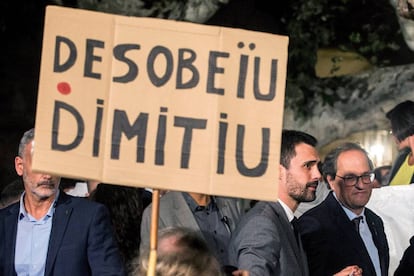In escalation of tension, Catalan police charge against protesters storming parliament
Violent activists broke through security cordons at the end of a peaceful pro-independence march in Barcelona

Hundreds of radical separatists defied the Catalan police on Monday, attempting to storm the regional parliament on the first anniversary of an unauthorized referendum on independence.
There were unprecedented scenes when violent protesters advanced towards the legislative building at the end of what had been a peaceful demonstration by thousands of pro-independence Catalans in Barcelona. At around 9.30pm, hooded activists broke through a police cordon and marched to the doors of the building crying “Occupy parliament!”

The Mossos d’Esquadra, a law enforcement agency under the Catalan government’s oversight, were forced to back into the building. At around 10pm, a team of riot police arrived and engaged the protesters, forcible removing them from the premises. Meanwhile, another group of radical activists surrounded the National Police headquarters on Via Laietana, where they hurled objects at officers until reinforcements arrived and dispersed the crowd.
The incidents illustrate how the government of Quim Torra, who had openly encouraged “keeping up the street pressure” that same morning, may be losing control over the independence movement. Leading members of the Committees to Defend the Republic (CDR), self-organized separatist groups who are behind road blocks and other forms of street protest seen in Catalonia this past year, on Saturday asked for Torra’s resignation.
Despite being widely considered a hard-line separatist himself, Torra is now viewed by these groups as a traitor to “the spirit of October 1” for failing to openly disobey the state’s institutions, and for using the Mossos against them at a Saturday march in Barcelona that descended into violence. The Mossos charged against CDR activists who sprayed them with paint bombs in clashes that resulted in six arrests and 24 injuries.

Cries of “disobey or resign!” were heard during the Monday evening demonstration despite Torra’s earlier attempt to reach out to radical sectors by telling them to“keep putting on the pressure, you are doing the right thing by putting on pressure.” And a separate student march in Barcelona asked for the Catalan interior chief, Miquel Buch, to also step down over the police charges on Saturday.
It is a reversal of roles for the Mossos, who a year ago were criticized by Madrid for not doing enough to stop the unauthorized referendum despite receiving court orders to do so. That vote yielded images of National Police and Civil Guard officers forcibly removing voters from polling stations while many Mossos stood by, a fact that has soured relations between the agencies.
The independence movement is currently divided between those who want to reduce the tension in order to add new supporters to the cause – a group headed by the Catalan Republican Left (ERC), a historical party whose leader Oriol Junqueras is in pre-trial detention over last year’s failed secession bid – and those who want to ramp up the pressure, such as the anti-establishment CUP party, a small group whose parliamentary support has been pivotal to keeping separatists in power.

In recent days, radical groups that are politically close to CUP have been feeling betrayed by the Mossos’ actions, blaming Torra and his aides, and openly demanding that the Catalan republic be made effective immediately. Following the Monday night incidents, moderate separatists sought to distance themselves from the violent protesters, saying that these are not part of the movement born out of October 1, 2017.
Meanwhile, opposition groups are also requesting Torra’s resignation over his support for radical activists. The leader of Spain’s conservative Popular Party (PP), Pablo Casado, said that Torra has crossed “another red line” with his statements, which “are an incitement to confrontation.” He compared the CDR’s actions to “kale borroka” – the street violence perpetrated for decades by radicals in the Basque Country – and compared the groups themselves with Cuba’s Committees for the Defense of the Revolution, referred to popularly as “the eyes and the ears of the revolution.”
Inés Arrimadas, leader of the unionist Ciudadanos – the single party that won the most votes at the last Catalan election in December – said it was “undignified”in a democratic country to have a premier acting as “the ringleader” of the CDR and “encouraging them to carry on with their violent actions.” Ciudadanos party headquarters in Barcelona have been the target of acts of vandalism by independence groups in recent months.
English version by Susana Urra.
Tu suscripción se está usando en otro dispositivo
¿Quieres añadir otro usuario a tu suscripción?
Si continúas leyendo en este dispositivo, no se podrá leer en el otro.
FlechaTu suscripción se está usando en otro dispositivo y solo puedes acceder a EL PAÍS desde un dispositivo a la vez.
Si quieres compartir tu cuenta, cambia tu suscripción a la modalidad Premium, así podrás añadir otro usuario. Cada uno accederá con su propia cuenta de email, lo que os permitirá personalizar vuestra experiencia en EL PAÍS.
¿Tienes una suscripción de empresa? Accede aquí para contratar más cuentas.
En el caso de no saber quién está usando tu cuenta, te recomendamos cambiar tu contraseña aquí.
Si decides continuar compartiendo tu cuenta, este mensaje se mostrará en tu dispositivo y en el de la otra persona que está usando tu cuenta de forma indefinida, afectando a tu experiencia de lectura. Puedes consultar aquí los términos y condiciones de la suscripción digital.








































